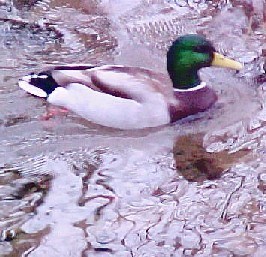The International Fund for Animal Welfare (IFAW) has announced it's intervened to allow a Sault Ste. Marie man to continue feeding a flock of mallard ducks through one of the coldest winters in memory.
Dan Romanchuk started feeding the ducks during the summer, but ran out of money when the fowl decided to continue enjoying his backyard hospitality through the winter, the IFAW said.
Our photo shows a mallard photographed by SooToday.com on Whitefish Island on December 14.
The following is the full text of a news release distributed by the IFAW:
***************************************************************** IFAW helps Sault man ensure ducks weather long winter
SAULT STE.MARIE, ONTARIO--With the help of the International Fund for Animal Welfare (IFAW), a local man is making sure a flock of mallard ducks in the city is fed over the course of a winter that is touted as one of the coldest on record.
The International Fund for Animal Welfare stepped in when they learned that Dan Romanchuk was running low on the money it takes to feed about 100 mallard ducks in Sault Ste. Marie over the winter.
Mr. Romanchuk began feeding the ducks over the summer, but when they kept visiting his backyard over the winter, he realized they weren't going to fly south and were dependent on him for their food.
"It is never a good idea to start feeding animals, as they quickly become dependent," IFAW's emergency relief representative Kim Elmslie said.
"In this case, when winter arrived the ducks' food source didn't run out, so they had no reason to migrate south. When feeding an animal, while the intentions are good, the animals are actually being inadvertently killed with kindness."
With the assistance of the Toronto Wildlife Centre, IFAW provided enough corn and wheat feed for the mallards to last the rest of the winter, until the lakes begin to thaw and the ducks can be tapered off the food.
"Although a situation like this shouldn't have arisen in the first place, it's wonderful that there are organizations out there who can help," Ms. Elmslie said.
"Thanks to this collaborative effort, a flock of mallards will live to see another spring."
****************************************************************
